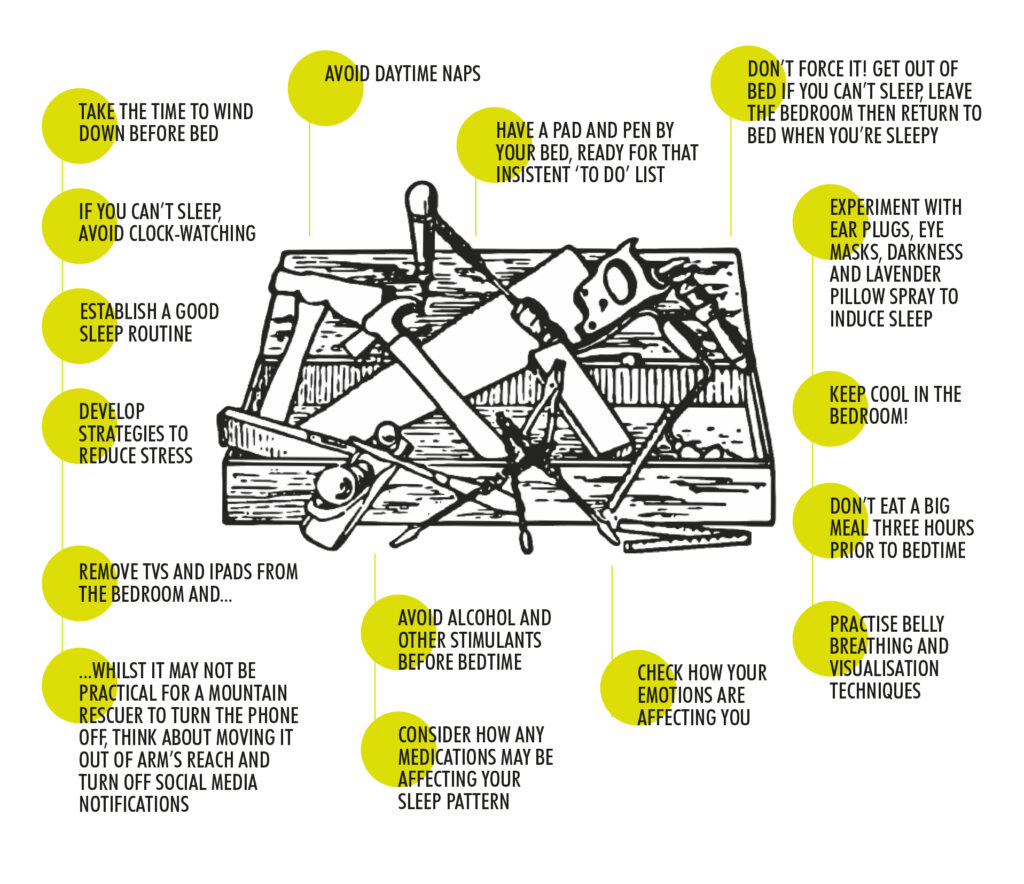Harnessing the restorative power of sleep
Once disrupted, poor sleeping patterns can become ingrained. So how do you break the cycle? Read on to learn about harnessing the restorative power of sleep…
From the archive: Mountain Rescue Magazine Winter Issue 71, January 2020: The Fire Fighters’ Charity.

The daily stresses of life and work, getting older, marital upset, bereavement, alcohol and drug use, poor diet, noisy environment, addictive technology — not to mention the odd extended or traumatic mountain rescue incident — all these things and more can affect your ability to sleep well.
Sleep is a process of surrendering the body, emotions and mind to a temporary ‘shut down’. There has to be a balance between these three elements for the organism to fall asleep. Don’t expect the body to perform a good night’s sleep if:
- Your body is restless, in pain, stressed or affected by caffeine, alcohol or other drugs that affect its level of energy and activation — it will be difficult to come to a resting point.
- Your emotions are playing out on their own accord with events that have happened or will yet happen. Upsets, anger, guilt, resentment, remorse, sorrow… any emotional discomfort or excitement can prevent you resting.
- Your mind refuses to rest with thoughts of ‘to do’ lists, deadlines and other problems. It will charge your body and emotions with activity, making it difficult to settle.
Identify the possible causes of insomnia
Stress and emotional issues such as anxiety and depression cause half of all insomnia cases, but your daytime habits, sleep routine and physical health may also play a role. Try to identify all possible causes of your insomnia.
- Are you under a lot of stress?
- Are you feeling depressed, emotionally flat or hopeless?
- Do you struggle with chronic feelings of anxiety or worry?
- Have you recently gone through a traumatic experience?
- Are you taking any medications that might be affecting your sleep?
- Do you have any health problems that may be interfering with sleep?
- Is your sleep environment quiet and comfortable?
- Are you spending enough time in sunlight during the day and darkness at night?
- Do you try to go to bed and get up around the same time every day?
- Are you taking naps during the day?
- Do you suffer nightmares?
Once you figure out the root cause — physical, mental or emotional, you’ll have a chance to deal with that specific problem and retrain your body to sleep with simple relaxation techniques and a sleep hygiene routine.
Physical
A combination of sleep hygiene and relaxation techniques will help restore a good sleep pattern. If it doesn’t resolve, see your GP for a physical evaluation.
Emotional
You’ll need to find a way to handle your emotions. This might be through regular meditation, yoga, Tai Chi, self-help reading, talking to a friend and sharing feelings, taking up a creative activity, or other practices that help you acknowledge and deal with your emotions. Don’t push them aside, they may go away temporarily but will surface again when you’re not busy.
It might be helpful to journal your emotions. Write them down if you can’t sleep and make a note of your dreams in the morning before starting your day. Dreams are a huge part of the sleep process, even if the dreams seem funny or weird — noticing them helps create an interest for your inner life.
If these strategies don’t work, consider seeking the help of a professional counsellor, psychotherapist, psychologist or cognitive behavioural therapy.
Mental
You can use many self-help strategies to cope with uninvited thoughts. The simplest is to get out of bed after trying to sleep for thirty minutes, and write your ‘to-do’ list down to get it out of your mind. Or, if your thoughts are just random ‘birds’, try focusing on slow deep breathing — diverting the mind to something soothing may help.

Sleep hygiene
Making small adjustments to your bedtime routine will help you sleep a great deal better.
- Make sure your bedroom is quiet, dark and cool. Try using a sound machine or ear plugs to hide outside noise, an open window or fan to keep the room cool, and black-out curtains or a sleep mask to keep out the light.
- Stick to a regular sleep schedule. Support your biological clock by going to bed and getting up at the same time every day, including weekends. Get up at your usual time in the morning even if you’re tired. This will help you get back into a regular sleep rhythm.
- Avoid naps (unless, you work shifts — see later). Napping during the day can make it difficult to sleep at night. If you feel you need to take a nap, limit it to 30 minutes before 3.00pm .
- Avoid stimulating activity and stressful situations before bedtime including vigorous exercise, big discussions or arguments and TV, computer or video game use!
- Limit caffeine, alcohol and nicotine.
- Use the bedroom only for sleeping and sex. Don’t work, read, watch TV or use your computer in bed or in the bedroom so when you get in bed, your brain and body get a strong signal that it’s time to nod off — or be romantic.
- Get out of bed when you can’t sleep. Don’t try to force it. Tossing and turning only ramps up the anxiety. Get up, leave the bedroom and do something relaxing such as reading, drinking a warm cup of caffeine-free tea, taking a bath or listening to soothing music. Write that ‘to-do’ list, note the emotions which are upsetting you and acknowledge them without judging them either good or bad or trying to change them. When you feel sleepy, go back to bed.
- Move bedroom clocks out of view. Anxiously watching the minutes tick by when you can’t sleep — knowing you’re going to be exhausted when the alarm goes off — is a sure-fire recipe for insomnia. You can use an alarm but make sure you can’t see the time when you’re in bed.
Relaxation techniques to help you sleep
A relaxing bedtime routine — focus on quiet, soothing activities such as reading, knitting or listening to soft music and keep the lights low.
- Abdominal breathing — most of us don’t breathe as deeply as we should. When we breathe deeply, involving not only the chest but also the belly, lower back and ribcage, we help engage our parasympathetic nervous system, which controls relaxation.
- Progressive muscle relaxation. Lie down and make yourself comfortable. Starting with your feet, tense the muscles as tightly as you can. Hold for a count of ten then relax. Continue to do this with every muscle group in your body, working your way up from your feet to the top of your head.
- Listen to relaxing/soothing sounds such as nature or instrumental music.
- Consider taking valerian as a tea or supplement for its mild sedative effects — but check that these do not interfere with or amplify the effects of any medication you may be taking. If in doubt, speak to your GP or pharmacist.
How to breathe from your belly
This is how you breathed as a baby. Belly breathing drops and lifts the big muscle of the diaphragm, the natural body mechanism that pushes air in and out of your lungs. It centres awareness in your body, rather than your head, so you feel more physically and energetically grounded and helps relax your neck, shoulders and arms. It also provides a wonderful massage for your internal organs, just as massaging your muscles adds to their tone and overall functioning, and increases the blood circulation.
Ideally, inhale and exhale only through your nostrils — only inhaling and exhaling through your mouth as a last resort. As you breathe, make both your inhale and your exhale smooth and full, without strain. When your exhale is full, your next inhale will naturally flow and arise by itself.
Focus on not holding your breath between the end of an inhale or exhale and the beginning of the next. Let one flow into the other in as relaxed a manner as you can.
Keep the tip of your tongue on the roof of your mouth and your mouth closed. If you make the sound ‘le’ (as in the word ‘let’), your tongue will touch the correct spot just slightly behind your top front teeth. When your tongue touches the roof of your mouth, it helps maintain deep belly breathing.
There is no gain in putting tension in your body by straining to take longer inhales and exhales. Breath-induced tension increases stress and outweighs the benefits of breathing quietly, softly and deeply in a relaxed manner.
Allow your lungs to expand to maximum capacity only if they seek expansion naturally. Don’t force it. By staying within 70-80% of your capacity, you will wean yourself from pushing yourself and gain the habit of relaxation.
You can practice the belly breathing any time you remember to do so. The goal is to train your body to breathe this way most hours of the day.
Coping with shift work
Shift work brings its own challenges, having to sleep during the day and stay awake and alert during work time. Adequate sleep and feeling rested is essential for good health, productivity, memory retention, weight maintenance and managing health conditions. Try these extra strategies to help you cope.
- If possible, take a short nap during your shift.
- Work with other people around you to increase alertness.
- Get moving during your breaks — go for a walk, stretch or do some exercise to keep your body active.
- Beware drinking caffeine too late in a shift — it may prevent you being able to sleep after work.
- Maintain the same sleep schedule, even on non-work days. Make sleep a priority at the weekends or on your days off so you can pay off your sleep debt.
- Avoid caffeine and heavy meals close to bedtime — and alcohol!
- Adjust your sleep/wake cycle when you wake up at night by exposing yourself to bright light. Use bright lamps or daylight simulation bulbs in your workplace and wear dark glasses on your journey home.

Where to go for professional help
bacp.co.uk British Association for Counselling and Psychotherapy.
psychotherapy.org.uk UK Council for Psychotherapy.
bps.org.uk British Psychological Society.
babcp.com British Association for Behavioural and Cognitive Therapies.
helpguide.org for information on everything to do with mental health and wellness — well worth a tour.
painscience.com for science-based advice on aches, pains and injuries, both mental and physical and related treatments and therapies.
sleepcouncil.org.uk and sleepfoundation.org for hints, tips and articles to help you get a better night’s sleep.
https://health.clevelandclinic.org/how-you-can-sleep-better-if-you-work-the-night-shift tells how you can minimise shift work sleep disorder.